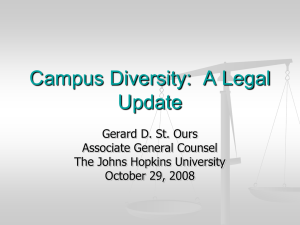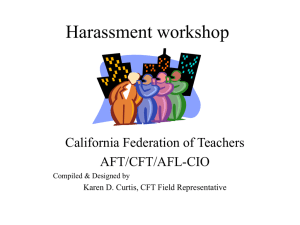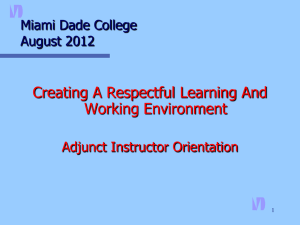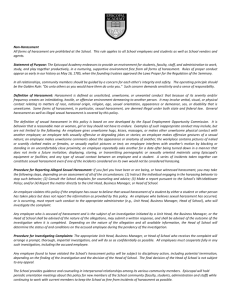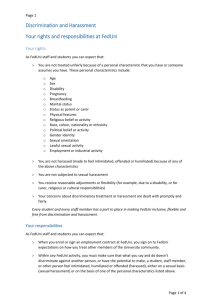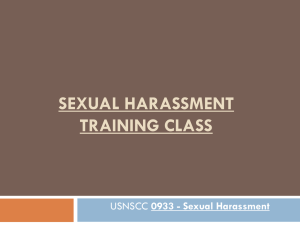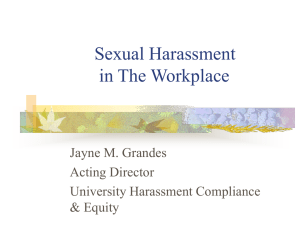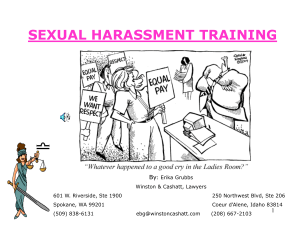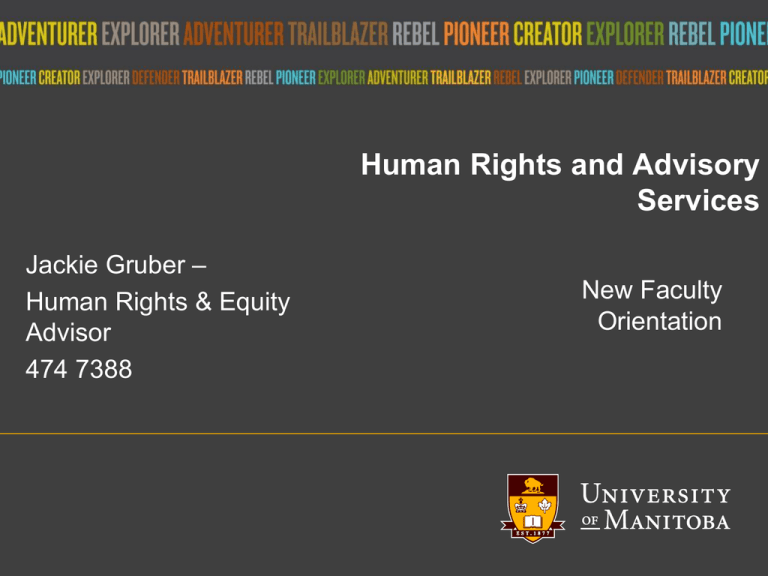
Human Rights and Advisory
Services
Jackie Gruber –
Human Rights & Equity
Advisor
474 7388
Title of presentation
umanitoba.ca
New Faculty
Orientation
Human Rights & Advisory Services Office:
• Our mission is to promote a respectful work and
learning environment in which individuals are treated
equitably and diversity is valued
• Administer the University of Manitoba's Respectful
Work and Learning Environment policy for the
University community
RESPECTFUL WORK & LEARNING
ENVIRONMENT POLICY
All members of the University community are bound
by the Manitoba Human Rights Code and
Workplace Safety & Health Legislation
Expected to adhere to the RWLE Policy which
covers the following:
Human rights discrimination or harassment
Sexual harassment
Personal harassment
Human Rights Discrimination
• Discrimination is differential treatment, whether
intended or not, of an individual or group on the basis
of actual or presumed membership in one of the
groups
• Failure to make reasonable accommodation for the
special needs of an individual or group as identified
by policy based on categories set out in the Manitoba
Human Rights Code and the U of M’s RWLE Policy
• Human Right’s based harassment
Human Rights Code Characteristics
•
•
•
•
•
•
•
•
•
•
•
•
•
Ancestry
Nationality or national origin
Ethnic background or origin
Gender identity
Sexual orientation
Marital or family status
Source of income
Political belief, association, activity
Physical or mental disability
Religion or creed
Age
Sex, including pregnancy
Social disadvantage
ACCOMMODATION OF DISABILITIES
Has become a struggle for all educational institutions
Must accommodate to the point of “undue hardship”
May discriminate if there is “bona fide”
academic/work related requirement
DO ANXIETY DISORDERS INCLUDE EXAM
ANXIETY?
• Exam anxiety is a new description of an old and well
recognized problem.
• Exam anxiety constituting a normal amount of stress
is not a disability, and does not require
accommodation.
• Exam anxiety can progress to a legitimate anxiety or
panic disorder, impairing participation in academic
requirements, and requiring accommodation.
OBLIGATION TO INQUIRE ABOUT OR DISCLOSE
DISABILITY
• Tribunals require only a suspicion of disability before a duty to
accommodate is triggered.
• The University is required to inquire of students when a disability
is suspected, and guide them as to what information will be
required for the consideration of accommodations.
• A duty to accommodate can be triggered even if the disability is
not disclosed in a timely way. Decisions may have to be
overturned, and accommodations be put into place retroactively.
• Two scenarios:
– Failure to disclose known disability
– Unknown disability subsequently diagnosed
Are we obligated to ignore our own Policies?
• In order to be reasonable, the University may have to
ignore its own policies.
• The Code is paramount legislation. It trumps:
–
–
–
–
Most other legislation
University policies
Departmental or program requirements
Collective agreements
• Any policy which conflicts with the Code could be
evidence of poor process.
BONA FIDE REQUIREMENTS IN SERVICE
• The University is a “service provider” to its students.
• It must be able to demonstrate that its academic
standards are necessary in order to ensure that the
degrees issued:
• Are respected and valued
• Meet accreditation requirements
• Allow students to enter professions
• This requires strong objective evidence. General and
self-serving impressions will not be accepted as
credible evidence.
CAN WAIVING REQUIREMENT OR LOWERING
STANDARDS BE REQUIRED?
• If no bona fide reason for an academic
standard is demonstrated, that standard must
be waived or lowered.
• Can a policy prohibit the waiving of certain
academic requirements?
• Only if such a prohibition is bona fide with
respect to each and every program to which it
applies.
BONA FIDE CAUSE IN OTHER PROGRAMS
• It is more difficult to defend standards in
non-professional programs.
• There are no accreditation standards or
professional standards to rely on.
• External reviews which compare our
programs to others are the best
evidence, but are rarely specific.
EXAMPLES OF ACCOMMODATION
•
•
•
•
•
•
•
A modified curriculum
Extra time for completing tests, exams and assignments
Alternative forms of evaluation
Academic materials in advance, and/or in alternative formats
Provision of and training on adaptive technology
Assistance and supports in class
Modify the way the student is expected to complete the
essential requirements of a program
• For grad students changing expectations of job requirements of
a TA or RA
Sexual Harassment/Harassment what is it?
•
•
•
•
A course of abusive and unwelcome conduct or comments made on
the basis of any protected characteristics 9(2); or
a series of objectionable and unwelcome sexual solicitations or
advances; or
a sexual solicitation or advance made by a person who is in a position
of authority if the person making the advance knew or ought reasonably
to know that it is unwelcome; or
a reprisal or threat of reprisal for rejecting a sexual solicitation or
advance.
SEXUAL HARASSMENT
SIX POINTS OF CASE LAW
Sexual Harassment:
Unwanted sexual attention made by a
person who knows or ought
reasonably to know that it is
unwelcome
Promise of reward or threat of
reprisal
Sexually orientated behaviour or
gender-based abusive and
unwelcome conduct or comment that
has the purpose if creating an
intimidating, hostile or offensive
environment
It was aware that harassment is
prohibited conduct
It had an adequate complaint
mechanism in place
It acted expeditiously in
handling the complaint
It dealt with the matter seriously
It met its obligation to provide a
healthy work environment
It met its obligation to inform the
complainant of its response
Examples of Sexual Harassment
• Sexist remarks, jokes, innuendoes or taunting about a person’s
body, appearance, characteristics or clothing
• Displaying of pornographic or other sexually offensive material
• Persistent and unwelcome invitations or requests for dates
• Leering, ogling or other sexually orientated gestures
• Inappropriate touching
• Sexual assault
• Inappropriate questions or sharing of information about a
person’s sexuality or sexual orientation
DUTY TO PROVIDE ENVIRONMENT
SAFE FROM HARASSMENT
Since February 1, 2011 this includes free from
psychological harassment
RWLE Policy:
We all have rights therefore we all have
responsibilities
What does this statement mean to you?
Bullying/Personal Harassment
• One or a series of objectionable and unwelcome
comments or actions directed towards a specific
target which serve no legitimate work or academic
related purpose and have the effect of creating an
intimidating, humiliating, hostile or offensive
environment
• Physical or verbal abuse, threats, or intimidation that
is humiliating or demeaning
Examples of Bullying/Personal
Harassment
•
•
•
•
Spreading malicious rumours, gossip or innuendo
Excluding or isolating someone socially
Undermining or deliberately impeding a person’s work
Making jokes that are “obviously offensive” by spoken word or email
• Belittling a person’s opinions
• Tampering with a person’s personal belongings or work
equipment
Examples of Bullying/Personal
Harassment
• Repeated or continuous incidents of yelling, screaming or namecalling
• Repeated or continuous threats to withdraw funding,
scholarships or advancement opportunities for reason unrelated
to performance
• Comments addressed to a person which have the effect of
undermining a person’s role in the workplace, classroom or
residence
• Verbal attacks
• Body language – gestures, eye rolling
How can bullying affect an individual?
•
•
•
•
•
•
•
•
•
Presenteeism
Lack of job satisfaction
Anger
Stress leave/ sick leave
Increased sense of vulnerability
Loss of confidence
Physical symptoms such as stomach pains, headaches
Panic, anxiety
Inability to concentrate
Human Rights & Advisory Services
Human Rights and Advisory Services believes that individuals need
to be able to discuss their concerns and to seek advice and
assistance in a safe and private environment
Procedures:
Informal File
Formal Complaint
QUESTIONS?
Please call Human Rights and Advisory Services at
474 6348 or follow the link:
http://umanitoba.ca/admin/vp_admin/ofp/hras/index.h
tml
Human Rights and Advisory Services
406 University Centre
Jackie Gruber
474 7388
If only it were that easy!
Title of presentation
umanitoba.ca



